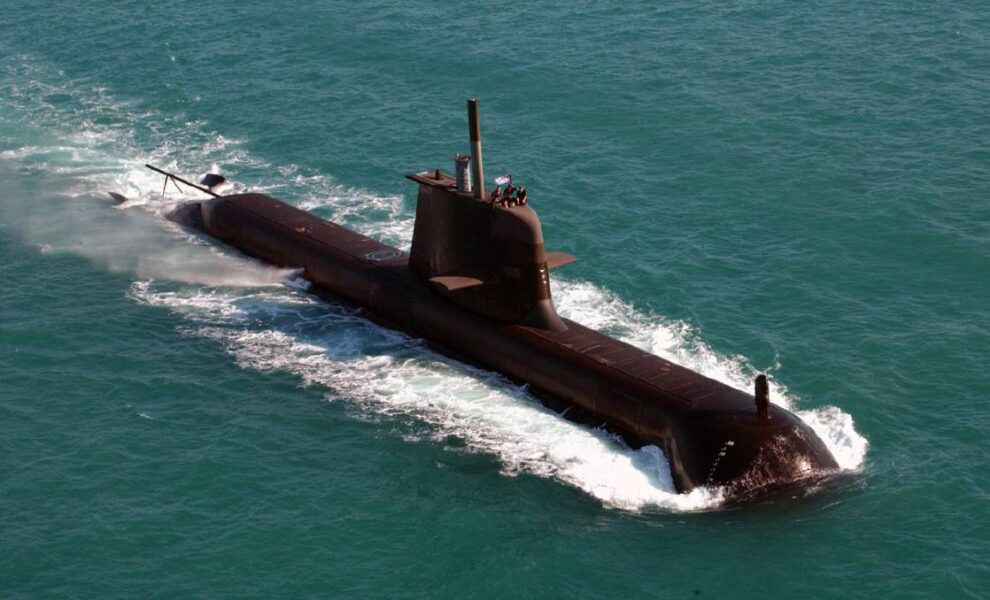A nuclear-powered submarine can be as potent as two diesel-electric boats, Defence Industry Minister Pat Conroy has claimed, offering the government’s strongest rejection yet of attacks on the AUKUS pact’s $368 billion price tag.
Mr Conroy also hit back at mounting industry criticism the government was delaying key defence decisions and not increasing military spending quickly enough despite strategic uncertainty with China, saying some projects were being brought forward.

“There’s a difference between companies not winning contracts that they thought they should win and money not being spent in the defence industry,” Mr Conroy said at the National Press Club on Tuesday.
He said the cost of eight nuclear-powered submarines was only marginally more than what the eight French-designed conventionally powered submarines the Morrison government cancelled would have cost.
The French submarines would have cost $235 billion to sustain and build over the period to the 2080s, which did not include weapons and workforce, for a capability that was increasingly vulnerable to detection and spent half its time at sea transiting before starting its mission.
In comparison, for a “moderately larger investment” nuclear-powered submarines can stay on station longer, spend only 15 per cent to 20 per cent of their time in transit and carry more weapons.
“A nuclear submarine has the potential to be the equivalent of
two diesel-electric submarines,” Mr Conroy said.
“You don’t just defend Australia by stationing pickets around Karratha or off Darwin; you need the ability to hold an adversary at bay and to threaten a potential opponent’s assets as far away from Australia as possible.”
While Mr Conroy is a senior figure in Labor’s traditionally big-spending left faction, he noted cumulative health spending would be $8 trillion by 2055 and the age pension $4 trillion, 20 and 10 times respectively the cost of the submarine program.
With the government coming under criticism for delays after commissioning a series of reviews – Mr Conroy this week pushed back the release of a new defence industry policy until next year – the minister said the shipbuilder for local construction would be announced early next year.
Given the so-called SSN-AUKUS is a co-design with the UK, the builder is widely expected to be UK defence giant BAE Systems – which builds Britain’s submarines – and the announcement could be timed as a salve for a probable cut in the number of frigates BAE will build in Adelaide. He insisted the hulls would be built locally.
No regional arms race
Despite legislation authorising the sale of Virginia-class submarines to Australia being caught in US congressional gridlock, lower-than-required production rates and opinion polls showing Donald Trump in a strong position to win next year’s US presidential election, Mr Conroy said strong bipartisanship for AUKUS gave him confidence the pact would endure.
He also denied Australia was fuelling a regional arms race, saying the government was simply responding to the biggest arms build-up since the end of World War II, accusing some unnamed people of turning a blind eye to contemporary security challenges.
Meanwhile, US Under Secretary of State for Arms Control Bonnie Jenkins gave a strong rebuke to repeated Chinese claims AUKUS would jeopardise nuclear non-proliferation, saying it did not breach any treaties.
“We’ve been saying it at nauseam for two years now and we know that [China] continues to attack us and the IEA governors board and at the Nuclear Co-operation Treaty and every other chance they get, but the story is the same. It hasn’t changed. And it won’t change. Australia does not want to develop nuclear weapons,” Ms Jenkins said at an Atlantic Council event on Monday (Tuesday AEDT).
“We’re not giving them nuclear weapons, we are giving them nuclear-powered submarines, and nuclear-powered submarines are allowed in the nuclear Non Proliferation Treaty. So that’s not a violation.”
She also noted that IAEA director-general Rafael Mariano Grossi had released reports affirming the AUKUS submarine exchange. “He’s been to Australia. He’s already had conversations with them.”
Source : Financial Review
















